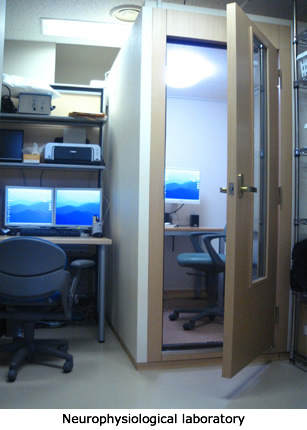Schizophrenia Group
Members
- Ichiro Kusumi
M.D., Ph.D.
Professor - Naoki Hashimoto
M.D., Ph.D.
Chief / Associate Professor - Atsuhito Toyomaki
Ph.D.
Sp. Appointed Assistant Prof. - Hisashi Akiyama
M.D.
Medical Staff / Graduate Student - Mariko Nohara
M.D.
Medical Staff / Graduate Student
Research contents
 Our group has studied the action mechanism of antipsychotics and experimental models of schizophrenia using amphetamine and phencyclidine by mainly a psychopharmacological method.
Our group has studied the action mechanism of antipsychotics and experimental models of schizophrenia using amphetamine and phencyclidine by mainly a psychopharmacological method.
Recently, we continuously attempt to clarify the pathophysiology of schizophrenia multidimensionally through neurophysiological studies such as event related potential and magnetoencephalography and brain imaging studies such as structural and functional MRI.
For the clinical aspect, the group focuses on the cognitive impairment of schizophrenia, evaluates neurocognition, social cognition and social functions together, and continues the attempt to improve cognitive function effectively using pharmacotherapy, cognitive remediation and psychiatric rehabilitation.
Furthermore, the group is developing a simple and easy cognitive function examination specific for schizophrenia, and is starting a functional MRI study during biological motion perception or reward prediction.
Further, we have started the examination for patients at risk mental state (ARMS) and schizophrenia patients, and attempted to achieve early intervention and respond to the needs of second opinion from other medical institutions.
In the hospitalization for examination, intensive measurement of the neurophysiological and neuroimage indices mentioned above is performed in a short period of one week, and the results obtained by biological markers in the presently highest level are fed back to the persons concerned and chief physicians.
In addition, for the purpose of developing a guideline to prevent glycolipid dysfunctions in patients with schizophrenia and bipolar disorder, a longitudinal study is under way for 1,200 patients in cooperation with 46 medical institutions in all over Japan.
Through these studies that are rooted in clinics, all the group members are doing their best efforts for medical treatments and studies in solidarity so as to contribute to further improvement of diagnoses and treatments of schizophrenia.
